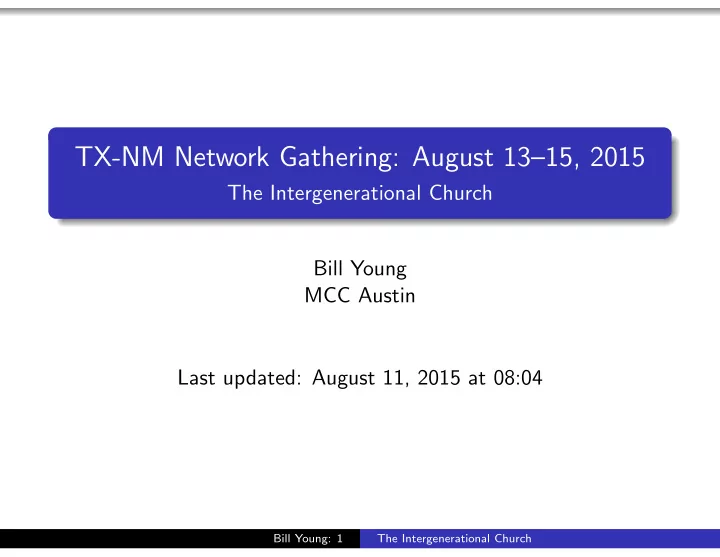

TX-NM Network Gathering: August 13–15, 2015 The Intergenerational Church Bill Young MCC Austin Last updated: August 11, 2015 at 08:04 Bill Young: 1 The Intergenerational Church
Sources John Roberto, “Our Future is Intergenerational,” Christian Education Journal , Spring 2012. Howard Vanderwell, Ed. The Church of All Ages: Generations Worshiping Together , Alban Institute, 2008. Bill Young: 2 The Intergenerational Church
Multigenerational vs. Intergenerational Multigenerational means a congregation comprising multiple generations. Intergenerational means a congregation in which multiple generations interact in meaningful, life-giving ways. “Intergenerational worship” is worship in which people of every age are understood to be equally important. –Howard Vanderwell How can our congregations become intensionally intergenerational? Why should we care? Bill Young: 3 The Intergenerational Church
Benefits of Intergenerational Relationships Lord, you have been our dwelling place throughout all generations. –Psalm 90:1 Roberto cites these benefits for intergenerational community: reclaims God’s intent affirms each person’s value fosters a foundation of support provides formation in faith to all generations teaches care for one another provides role models teaches us to value older adults allows passing on traditions of family and faith Bill Young: 4 The Intergenerational Church
Benefits of Intergenerational Relationships enhances people’s identification with their congregation encourages greater faith in all generations fosters leadership regardless of age or stature utilizes the strengths of all promotes understanding of shared values and respect for individuals in all stages and ages of life utilizes creative talents of all to provide service to the church and community Bill Young: 5 The Intergenerational Church
Mentorship Teach them the statutes and instructions and make known to them the way they are to go and the things they are to do. –Exodus 18:20 “The number one predictive factor as to whether or not a young Christian will retain his or her faith is whether that person has a meaningful relationship with an older Christian.” –Drew Dyke Bill Young: 6 The Intergenerational Church
Towards an Intergenerational Community In Bridging Divided Worlds , Carroll and Roof studied how different religious communities confront tensions between generations: An inherited-tradition congregation try to conserve its heritage, without working to adapt it to changing congregational demographics. A blended congregation makes a conscious effort to appeal to all generations. It values inherited traditions but adapts them to changing circumstances. A generation-specific congregation addresses the cultural characteristics and needs of a particular generation. Which do you think would be most successful at building intergenerational community? Do the others have a place? Bill Young: 7 The Intergenerational Church
How It Benefits the Church Intergenerational worship carries weight with many folks looking for a church home. A healthy congregation reflects the diversity of the community. A diverse congregation appears welcoming to all types of people. Is there benefit in having a variety in service offerings that may separate the community? Bill Young: 8 The Intergenerational Church
Generations Theory in This The lessons each generation has learned, the values it has adopted, and its way of seeing serve as a lens or a filter through which the world is experienced and understood. Such generational filters lead to a natural conclusion, arrived at by each successive generation, that there is a “right way” to be in the culture. –Gil Rendle, in Vanderwell, p. 58 Isn’t that the same conclusion as generational theory? What does it mean for worship planning? For social interactions? Bill Young: 9 The Intergenerational Church
How to Get There “In too many congregations intergenerational worship is simply a search for those compromises that will be most palatable or least offensive to the participants.” –Rendle, p. 59 “Leaders must look at worship and other congregational practices from the perspective of purpose rather than preference. Intergenerational leadership is a way of seeing each other, the purpose of the church, and the need to be flexible in our strategies for worship, leadership, and decision making.” –Rendle, pp. 64–5 Bill Young: 10 The Intergenerational Church
Breaking Down Barriers Amy Hanson (“Breaking Down the Age Barriers,” 2008) found ways in which innovative churches are intentionally building intergenerational ministries: Creating natural ways for the generations to serve together. Honoring older adults by asking them to tell their stories. Educating the church body on the value of intergenerational ministry. Finding ways to make the worship service multi-generational. Encouraging affinity groups, rather than age groups, as a way for people to connect. Hosting strategic intergenerational events. Matching young people with older adults in mentoring relationships. Are you doing any of these in your church? Bill Young: 11 The Intergenerational Church
Exercise Gather into a group with other members of your home church. Consider the following questions: 1 Are there ways in which your church practices “congregational segregation” on Sunday morning? 2 Do you have events that are age-specific? Is there a good reason to do so? 3 How can generational theory help to build an authentic intergenerational faith community? 4 How can a sermon possibly be meaningful and relevant to all of the generations in our congregation? How about music? 5 How intensional are you about making your church welcoming to all types of diversity? Bill Young: 12 The Intergenerational Church
Recommend
More recommend